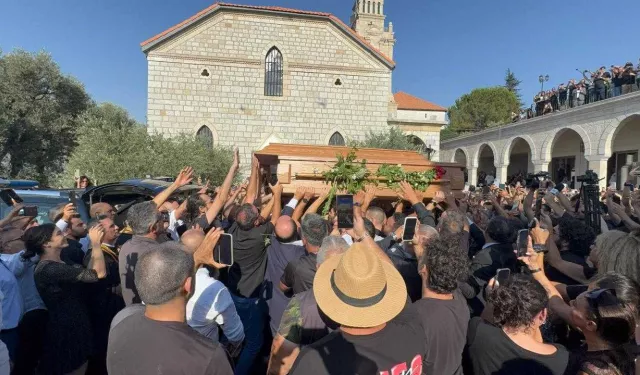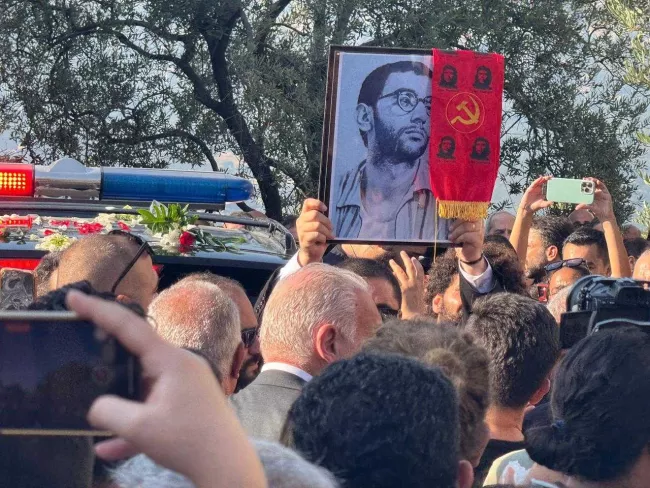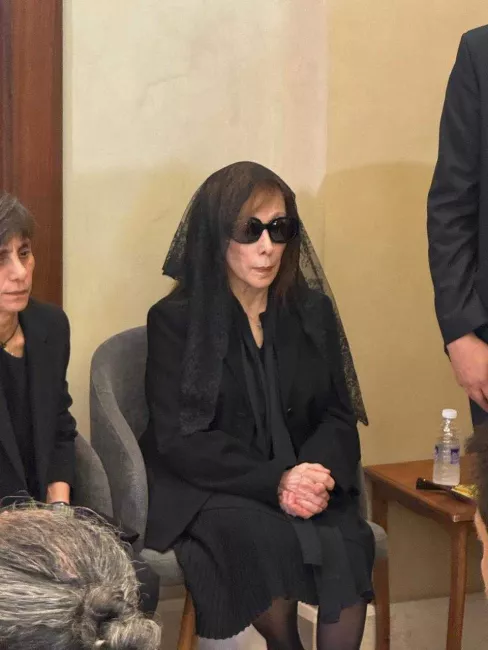
Ziad Rahbani’s final act: A funeral in his own voice
Ziad Rahbani, the man who filled the world with his voice and ideas, wanted his death to be a continuation of the rebellion he waged against surrender—to war, to authority, to classism, to injustice.
Those who followed his coffin from Beirut’s Hamra neighborhood to the village of Mhaydseh in Mount Lebanon were a reflection of him. They were, in a way, him. Their language was his. His words, which they knew by heart, seemed to carry the simple casket.
In his funeral, Ziad escorting Ziad. Could it be one last joke? This man never acknowledged the limits of irony.
By 6:30 am in Hamra, friends, fans, and disciples of Ziad had already gathered.
They were grieving his departure, yes, but they were also angry that his family had tried to monopolize his farewell in a way that didn’t resemble him. It’s nothing new in a society that claims its dead, no matter how much they rebelled in life.
The Rahbani family had their way: an obituary filled with names and sayings that meant little to Ziad, who left “endowed with the divine mysteries” as the announcement claimed, and a funeral adhering to the religious and social conventions he spent his life defying.
Ziad Rahbani’s farewell became two farewells: one popular, the other official.
Almost spontaneously, people on social media began asking: How could Ziad Rahbani’s funeral be limited to the family? Who made this selfish and cruel decision? Did the Rahbani family own Ziad? His own chain of defiance unspooled again, culminating in the idea of gathering in front of the hospital where his body lay.
And so the farewell split in two.
With tears, with Ziad’s songs, with the shock of loss, and with heartfelt condolences exchanged between friends, the crowd grew until the gathering resembled a political and artistic festival. Nearly 2,000 people took part. Ziad, it seemed, was mocking death itself—the same death he reportedly refused to delay by declining treatment in his final months. He sang with his friends:
“Coming with the suffering people… Coming to find out who owns my land,” and “The one who prays on Friday, and the one who prays on Sunday… Keeps plowing us throughout the week,” and “What are these times we’ve come to, they say a rich man gives to the poor.”
Many in the crowd joined in these songs. Some walked along Hamra, singing, “It’s time to say goodbye,” tracing his steps through the neighborhood where he had lived in apartments and played in bars like Barometer, Blue Note, and Chez Andre.
The procession also passed by his final home. It is said that Fairuz used to slip in quietly every Saturday night to check on her son.
But what surprised everyone was that those who thought their goodbye in Hamra was enough couldn’t help but follow him to Bikfaya-Mhaydseh, where the family held the funeral and accepted condolences at their church, about 30 kilometers outside Beirut, supposedly closer to where Fairuz lives.
If Ziad’s passing was the earthquake, Fairuz’s presence was the story.
There had been speculations that she would enter through a backdoor to bid her final farewell and then quietly leave. The crowd received these unconfirmed reports with calm acceptance. After all, this is Fairuz, the woman who is never seen. Fairuz, to whom the rules do not apply.
But that all shattered at 11 am, when the condolence reception began in the church hall.
Ziad had something else in mind. The same Ziad who, with the 1990s album “Kifak Inta,” pulled Fairuz down from her pedestal and presented her to a new audience in his own language and terms—“How are you? They say you now have kids,”—and later, in simpler, plainer lyrics—“The olives were different, the soap was different”—provoking outrage among those who saw her as angelic and untouchable. Now, 34 years later, he brought her down again. But not for art. This time, his departure made her just a mother.
Fairuz stepped out of the car as a human being. She walked solemnly among the crowd to bid farewell to her beloved son. She didn’t care about the aura surrounding her, the icon she’d become, or her age—well past ninety. This was a day of immense gravity for all of Lebanon. How could it not be for her?
Yesterday, she was the grieving mother, the ordinary mother broken by the loss of her child. She stayed for seven hours receiving condolences. She wept during the funeral mass, her tears slipping behind her glasses, a reminder that Fairuz is a tangible presence. That was no small thing for the many who had never approached her, not because they were forbidden, but because their strength failed them the closer they came to the possibility of reaching her.
Amid the majestic scene of Ziad’s departure and Fairuz’s presence, Lebanon itself appeared—with all its contradictions, diversity, differences. All of Lebanon came to say goodbye to Ziad and to glimpse Fairuz, who hadn’t been seen in public since her last stage appearance in 2011. A mixture of left and right, rich and poor, intellectuals and the indifferent, believers and skeptics, the sincere and the sycophantic, the camera-shy and the fame-seekers. Everyone who had once found solace in Ziad, who turned to his words and music in search of themselves.
Because to him Lebanon was all of these people.
What they couldn’t do in Hamra, they did in Mhaydseh: they lifted his coffin high and danced with it, applauded, and wept, as if saluting a musician who had just comosed his final piece—before he was taken to his final resting place.
Ziad, that wellspring of knowledge —even in death—leaves behind a vast and unpublished musical archive that will sustain his admirers. He leaves a diverse and profound legacy that would be impossible for most to compile in a lifetime.
He once wrote in his book My Friend, God, penned at age fourteen: “The days are doors. At each one, a guard. And we are fated to create each day anew, with a poem at every door to distract the guard into letting us pass to the next.”
Now, with his passing, it is as if he has left us one final verse—a last, defiant poem that opened the final door.

